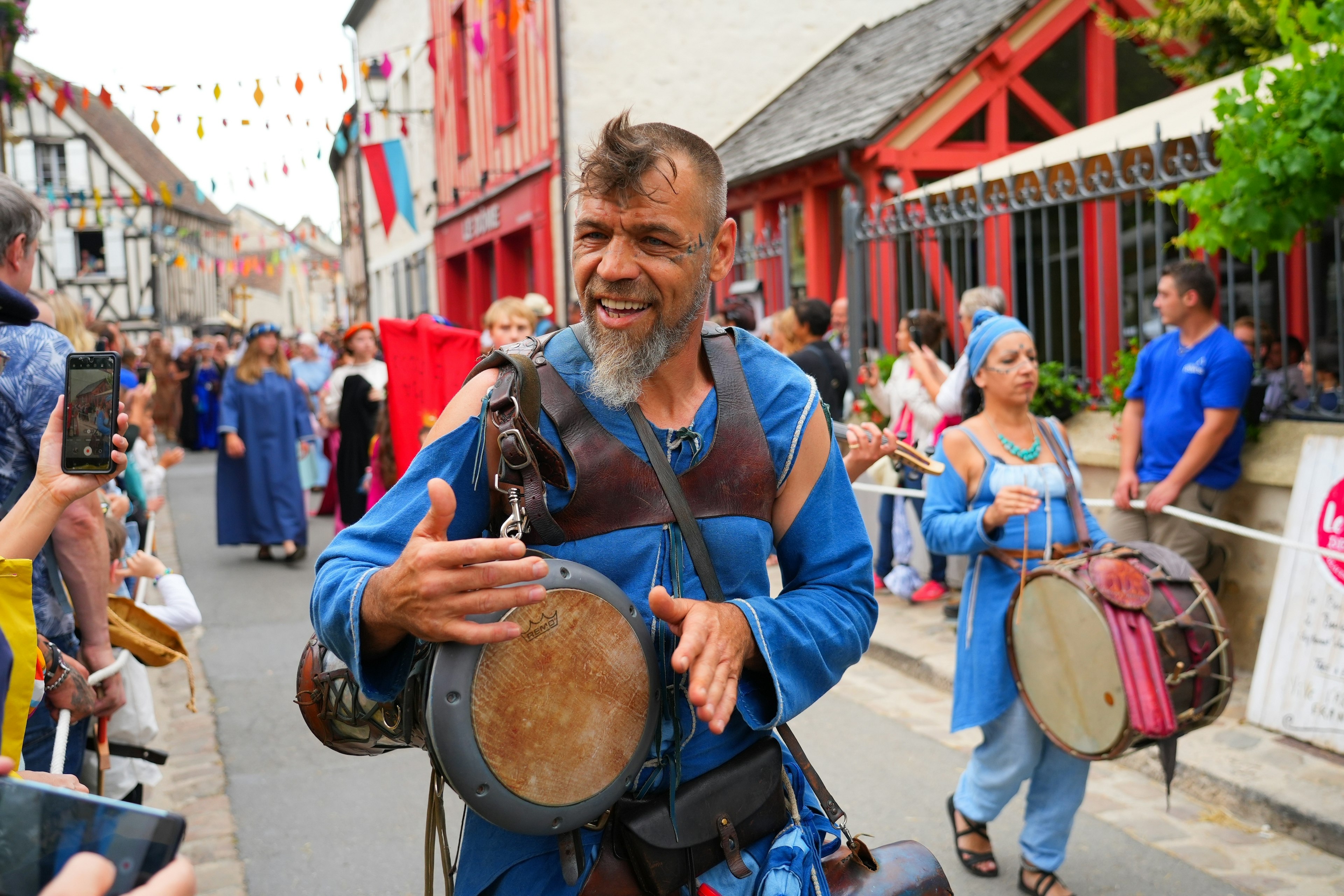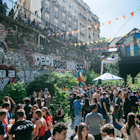
Dec 5, 2024 • 10 min read

Jun 2, 2024 • 8 min read

Wander the medieval ramparts of Provins, an unmissable stop for history lovers © Lev Levin / Shutterstock
The fortified medieval town of Provins, just 92 km (57 mi) south-east of Paris, has barely changed since the 17th century. Now a UNESCO World Heritage Site, a million tourists visit every year to admire the town which was, in the 10th century, the third most important in the kingdom of France after Paris and Rouen.
Still partially surrounded by its 25 m (82ft)-high ramparts and moat, it was developed by the powerful Counts of Champagne as a major trading post between northern Europe and the Mediterranean. It became so important it had its own currency, the Provins “denier” or penny, and it was thronged with merchants from all corners of the globe during their annual trade fairs. Provins is also the proud home of the Rosa gallica (or rose of Provins), parent to most European rose cultivars.

If crowds don’t worry you, then come during the that takes place the second weekend of June (though this year it's on June 1st and 2nd because of the Paris Olympics), the biggest such event in France. Troubadours, acrobats and crowd entertainers fill the streets lined with 350 craftspeople peddling their wares. There’s also dancing, music, games, jousting, street performances and the traditional medieval ball, a concert and a Sunday parade with 700 people in medieval costume. You must and you'll get a discount if you come in medieval costume!
Other festivals include the one-day Harvest Festival (“Fête de la Moisson”), which is always held on the last weekend of August; note that this year it’s been canceled as it clashes with the Olympic Games. Provins also holds a medieval Christmas market on December 14th and 15th.
If you want to see the Rosa gallica flowering, visit from mid-May to June – you’ll see the blooms in the and foaming over private walls and fences.
If you’re traveling with children (or even not!) and want to soak in the medieval atmosphere at one of the historical shows, plan your trip between the end of March and the end of October. These shows take place in most weather conditions; if there's wind or heavy rain the falconry show might be canceled, but even in inclement weather the knights will joust.
Provins' historical sites are open all year (afternoons only during winter weekdays, all day at the weekends), as is the town's medieval-themed.
Read more: 7 easy day trips from Paris we love
You'll need two days to be comfortable, but a day-trip will still give you a taster. Explore the town's ramparts, admire the picturesque half-timbered houses along the Voulzie River (an area almost entirely ignored by most tourists), eat at France’s oldest restaurant (it’s been serving meals continuously – except during Covid - since 1270!), learn how to make authentic medieval biscuits at a cooking class, or relax at the spectacular bar in the cellar storeroom at the.

There are 16 trains a day from Paris Gare de l’Est to Provins; the journey takes about an hour and a half and costs €5 one way.
The town of 12,000 residents has two distinct areas: the “Châtel” on the promontory in the northwest corner (where the ramparts and many of the medieval monuments are), and the “Val” that dribbles southeast down the hill, where the Provinois (city locals) reside, work and shop.
It’s a pleasant 2km walk from the train station in Val to the tourist office in the Châtel along the rue des Marais by the Voulzie river through the bustling town center - the last bit is uphill. You can also hop on a bus, but it leaves 20 minutes after the train has arrived so it’s just as quick to walk. If you come by car, park it for free by the tourist office: you’ll not be needing it for the rest of your stay.
Pick up a map from the tourist office and follow one of three suggested sightseeing walks; they largely follow the same itinerary. If you follow the orange Count Thibaud or blue Rose Road tour, pause at 12 rue de Jouy at the for a refreshment or some biscuits made from authentic medieval recipes – this is also where you can take that medieval cooking class we mentioned. The blue tour detours to the Rose Garden, while the purple Rampart Tour takes you around the ramparts instead. The orange itinerary is the shortest (1.5 hours) and the purple one is the longest (up to 3.5 hours).
Some of the streets – notably the rue Saint Thibault – are steep and cobbled, so wear flat shoes. If you intend to visit the underground galleries, bring a warm jacket as the temperature hovers at about 12°C (53°F) all year around.
Read more: How to get around France: from cycling to traversing by train

Your first port of call should be the thirteenth-century Grange aux Dîmes or on the rue Saint Jean, where you’ll learn about the famous Provins trade fairs that took place here throughout the twelfth and thirteenth centuries. Be sure to use the lively and informative audio-guide, or you’ll just be looking at pretty scenes dominated by life-sized wax figures.
At the end of the street, turn right into the Place du Châtel, a plaza lined with some remarkable stone and timber-framed buildings and a number of restaurants. Closest to you, at the western end, note the well with its wrought iron cage and large Exchange Cross: this is where the Counts of Champagne posted their public notices.
At the eastern end take the street furthest right, the rue de l’Ormerie, towards the emblem of Provins: the 12th-century, the only known octagonal castle built on a square base. Download a free audio-guide on your smartphone (in French only for the moment, but the English one should be available soon) for the full experience, but if you skip it, you'll still have fun clambering to the top for a marvelous view of the town and surrounding countryside. And if the kids are feeling active, the grass banks at the base of the keep are fantastic to roll down!
Then slip around the uncompleted, cathedral-like 12th-century collegiate church and down the tiny rue d’Enfer to find yourself at the bottom of the rue Saint Thibault. Here you can either visit the (guided tours only: book at the tourist office) or head towards the Place St Ayoul, where the very first Provins fairs were held. The intriguing black sections on the St Ayoul church portal were made by sculptor Georges Jeanclos in 1985.
If you want some peace and quiet, slip into the neighboring, which was sold to the state at the end of the 18th century for various police and army functions (including housing the cavalry!). The defense ministry handed it back to the culture ministry in 1938, who then restored it, uncovering some lovely, dainty frescoes. The modern stained glass windows are by German-French artist Udo Zembok.
If you’ve come by train then do this itinerary backwards, starting with the priory and walking slowly uphill.
Read more: 8 best things to do in France
I have taken elderly parents, friends and children to Provins countless times and a firm favorite has always been the “” (or Aigles de Provins) show, which explores the history of falconry and leaves even the smallest child wide-eyed in wonder at both the horses and the majestic, swooping eagles, vultures and other birds of prey; they can go and see these animals close-up at the aviary after the show.
Older kids will also love the but head's up: the thundering horses, shouting and sounds of clashing weapons frightened my children when they were little.
The quick answer? Quite a bit. If you want to attend the two shows above and see at least four of the five major sites, you’ll spend €43 per adult.
The Provins Pass (€17 per adult, €10.50 for children from 4-12 ) allows you to visit five attractions: the Tour César, the Tithe Barn, the underground galleries, the Saint-Ayoul Priory and the. If your family consists of two adults with two to five children, then buy the family ticket for €50. If you only have time to visit three of the five attractions, then individual tickets may be a good bet. They clock in at €5 per adult and €3 per child (€2.50 for the museum), except the tickets to the Underground Galleries, which cost €6 per adult and €4 per child.
My favorite shows mentioned above each cost €13 per adult and €9 per child (4-12 years old), and there are reduced prices for students, adults over the age of 65, the disabled and journalists.
Surprisingly, given the number of visitors, the choice of accommodation in Provins is a bit limited. There are four hotels ranging in price from €80-€204 and they don’t all include breakfast; you'll also find half a dozen guest houses including the extraordinary, where each room is dedicated to a children’s tale.
The bus (3207 or 3209 or Express50) from the train station to Le Châtel costs €2.15 per person.
Meals and coffee will be cheaper in the Val, where tourists are fewer than in the Châtel. Expect to pay around €90 for lunch for two at the Bistrot des Remparts or the. The latter serves traditional French food, but they will make you something vegetarian if you ask nicely. Cheaper options (about €50 for two) are available if not very locally flavored, like the Trattoria du Val and La P’tite Savoie, both straight down the hill from the Place du Châtel.


Dec 5, 2024 • 10 min read

Dec 4, 2024 • 9 min read

Dec 2, 2024 • 6 min read

Oct 31, 2024 • 11 min read



Aug 23, 2024 • 8 min read

Aug 1, 2024 • 5 min read

Jul 12, 2024 • 5 min read